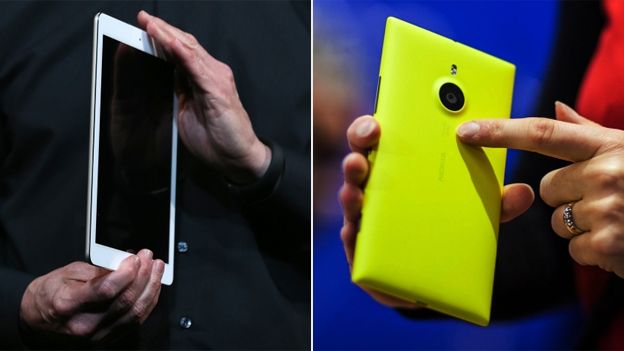Mac v PC - the battle resumes
- Published
- comments

Tuesday saw two big product launches on one day - and from each, interesting signs that an old rivalry might be flaring up again.
For 20 years Microsoft and Apple slugged it out - with Bill Gates' company the Goliath and Steve Jobs' firm the plucky David, mostly failing to be anything other than a noisy sideshow. Then competition intensified as Apple came roaring back with its iProducts, but in recent years both companies turned their fire instead on Google as the big new kid on the block threatening to take away their toys.
But at Apple's event on Tuesday night, where a new, thinner iPad made the headlines, was more interesting for what it said about the renewed rivalry with Microsoft. It started with the unveiling of new, typically expensive - if very high-specification - computers, those objects supposedly made obsolete by the rise of the tablet.
Tim Cook told the audience that this part of the business (from which, by the way, Apple only makes a tiny share of its huge profits) was still vitally important - and he mocked another company that didn't know whether it wanted a tablet to be a PC or vice versa. In the week that Microsoft's Surface 2 goes on sale, it was clear who he was talking about.
The only real surprises in the 90-minute show came with the announcements that Mavericks, the latest version of the Mac operating system, would now be free to download and updated versions of its iWork apps, Apple's rival to Microsoft's Office software, would now come free on any new iOS device.
Big deal, said anyone from the open source community, where the idea that you would pay for software has long been seen as old-fashioned. But it might be a concern for Microsoft. It still makes big bucks by charging for Windows and Office, so Apple's move could be seen as a direct threat to its business model.
Mind you, there had been evidence earlier that Microsoft might at last be making progress in the area where Apple had left it far behind, mobile devices.
I'd tuned into the live stream from Abu Dhabi of Nokia World, the phone giant's last big event before it disappears into the embrace of Microsoft. And I came away with two questions - is the Windows Phone operating system finally getting some traction, particularly on the latest Nokia Lumia phones? And does that mean Nokia's board sold the phone business at exactly the wrong time?
Nokia's CEO Stephen Elop had the slightly strange job of unveiling some quite impressive new products and software, which will now contribute to the Microsoft bottom line, where he will be running the devices division or possibly the whole business.
Lumia is getting larger, with the 1520 Phablet, and Nokia has at long last unveiled a tablet, the Lumia 2520, running the Windows RT operating system. Just how that will be marketed inside Microsoft, where so much has been invested in the Surface, will be an interesting question for Mr Elop.
But the amount of innovation that has come out of Nokia in recent months has been truly impressive, in particular in the key area of mobile phone photography, where the Lumia 1020 seems to have the most advanced camera on the market.
And finally that seems to be showing in sales, with the Wall Street Journal reporting that eight million Lumias were sold in the last quarter. True, that compares with nine million new iPhones sold in just three days. But momentum is key in this market, and at last Nokia, and hence Microsoft, is getting some.
What still deters many from taking the plunge and embracing Windows Phone is a lack of compelling apps. So the most important announcement out of Abu Dhabi was the imminent arrival of Instagram, the vastly popular picture-sharing app whose absence has been a glaring hole in the Windows portfolio.
And now there's another opportunity for Windows to make progress at the business end of the mobile industry. With confidence seeping away fast from Blackberry, many organisations will be pondering where to take their business next. Some have already switched to the iPhone, others will wonder about Android, although they may have concerns about security.
But enterprises which already have a long-term relationship with Microsoft - and that's just about all of them - may now think that Windows Phone devices can offer them a safe solution to their needs.
The Mac v PC battle is going mobile - and if Microsoft does at last manage to make an impression in this world, there could be huge rewards. Nokia's board will then ask itself whether it got the right price for all that innovation now under the control of its former CEO in Redmond.